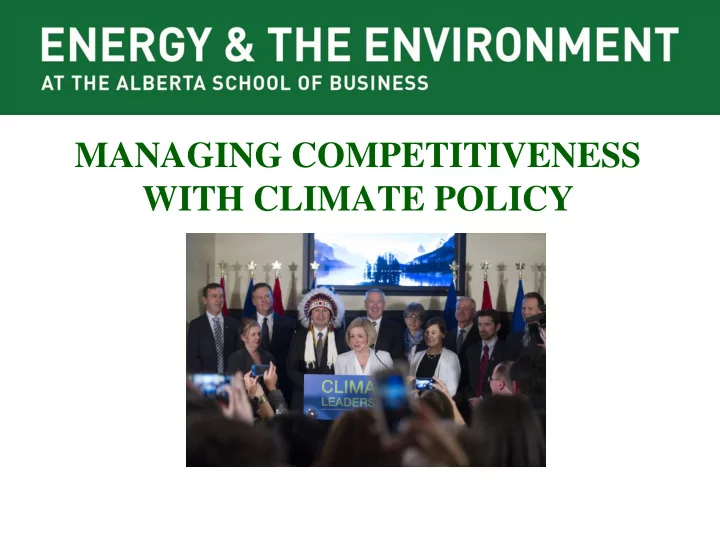

MANAGING COMPETITIVENESS WITH CLIMATE POLICY
Alberta’s Climate Leadership Panel Disclaimer: The opinions and context provided herein are not representative of and should not be interpreted as statements on behalf of the Government of Alberta or on behalf of the Climate Leadership Panel. This presentation includes a summary of recommendations and process from the perspective of the panel chair, Andrew Leach.
3 Carbon Levy and Carbon Competitiveness Regulation • An economy-wide price on carbon starting at $30/tonne in 2018 and increasing by 2% per year above inflation • Builds on the existing SGER by: • Making it broader • Previous policy covered only about 50% of emissions • Proposed policy will extend coverage to ~90% of emissions • Making it better • Previous policy allocated free emissions permits to facilities in proportion to their historic emissions intensity • Higher emissions firms in the same industry received more free permits • Proposed policy would allocate permits based on sector-level benchmarks
Other measures • Coal phase out • Renewable power procurement program • Energy efficiency programming • Methane regulations
5 The choice of the carbon price • We chose $30/tonne initially • Comparable to BC • Consistent with changes to SGER imposed in June, 2015 • Higher than prices in ON, QC, California and the EU • Inside the range of estimates of the social cost of carbon from the US government, although lower than estimate used for policy evaluation • We recommended an escalation of 2% above inflation • Alberta’s carbon price would rise with estimates of the social cost of carbon • We recommended a comparison to the actions of others before adjusting the price
Alberta’s major industries are EITE
7 Compliance costs under existing program
8 Compliance costs under existing program
9 Compliance costs under existing program
10 Compliance costs under existing program
Carbon pricing and complementary policies 11 Electricity sector • Carbon pricing forms the backbone of the system • Applied with good-as-best-gas output-based allocation • Natural gas power will be cheaper than under SGER, coal power will see costs increase significantly • Coal phase-out by 2030 with details determined in collaboration with industry and the AESO by newly-named facilitator • Renewables support program • Clean power call with government purchases of RECs • Quantity of support such that 50-75% of retired coal generation could be replaced with renewables.
12 Carbon Competitiveness Regulation � $40.00� � � $35.00� � � $30.00� � � $25.00� � � $20.00� � � $15.00� � � $10.00� � � $5.00� � � $-� � � � 1� 2� 3� 4� 5� 6� 7� 1� 2� 3� 4� 5� 6� 7� 8� 1� 2� 3� 4� 5� 6� 7� 8� Coal� Power� Plants� Cogenera: on� Units� Natural� gas� fired� power� plants� Exis: ng� SGER� Proposed� CCR�
Carbon pricing and complementary policies 13 Electricity sector • Carbon pricing forms the backbone of the system • Applied with good-as-best-gas output-based allocation • Natural gas power will be cheaper than under SGER, coal power will see costs increase significantly • Coal phase-out by 2030 with details determined in collaboration with industry and the AESO by newly-named facilitator • Renewables support program • Clean power call with government purchases of RECs • Quantity of support such that 50-75% of retired coal generation could be replaced with renewables.
14 Electricity Prices
Coal Phase Out
Other complementary policies • Oil and gas methane emissions • Combination of provincial and federal regulations and market-based approach proposed • Market-based approach could allow significant new investment opportunities • Orphan well risk is an issue here as well as new investment competitiveness • Energy efficiency program • Compatibility with Alberta’s deregulated electricity and natural gas markets • Provides options for emissions-intensive firms not covered by the EITE treatment
17 Conclusions • Getting climate policy right depends on: • Understanding the current conditions, micro and macro • Preventing adverse impacts and too-rapid changes • Using the right tools • Doing the right follow-up • Having access to the right information • Not being afraid to course-correct and to admit to the existence of winners, losers, etc.
18 CONTACT INFORMATION Andrew Leach University of Alberta School of Business andrew.leach@ualberta.ca Twitter: @andrew_leach
Recommend
More recommend